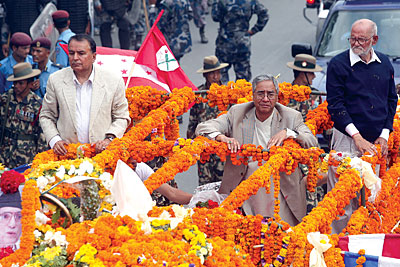 KIRAN PANDAY |
The commentary following Girija Prasad Koirala's death has focused predominantly on his controversial record as prime minister during the 1990s, his stellar contribution to the peace process, and the vacuum we are now facing. This is understandable, for GPK's most tangible impact at the national level was post-1990.
But of his 62 years in active politics, GPK spent 47 years (1947-90 and 2002-06) fighting for democracy. Biratnagar's Jute Mill and Koirala Niwas, the das gajja at the India-Nepal border, the open fields and safe houses in Bihar's Farbisganj, Patna and Varanasi's lanes, Delhi's power corridors, Kathmandu's prisons, the Tarai's district headquarters and villages � these were GPK's haunts. Everyone today has a story to tell about their association with Girijababu because for close to half a century, he remained a man of the people, not a creature of Baluwatar.
Along with thousands of other anonymous warriors, GPK recognised that the primary challenge for his generation was to bring freedom and democracy to Nepal. He deserves appreciation for responding to the call of the time. There was a repressive regime in place; society was stifled; a new generation could see that opportunities were passing
them by; and Nepali Congress and other dissenters provided a platform to channelise this discontent.
But the freedom that GPK helped bring in 1990 and 2006 has led to a fundamental transformation of Nepali society, throwing up an entirely new set of challenges. Stuck in relatively petty, manipulative politics after taking over, Girijababu failed to address the macro issues. As he admitted in the late 90s once, his politics was geared towards bringing democracy but the politicians didn't quite know what to do with it when it came.
That is precisely the question for the next lot of leaders who will take up the reins. Will they respond to the call of their time, less about fighting for democracy than consolidating it and using it to address popular aspirations?
While GPK had hoped that the country would not have had to fight for democracy yet again, circumstances may dictate otherwise.The peace process is in limbo and the far right and far left have gained ground in recent months. The quest for a democratic constitution laying the grounds for a stable polity remains elusive. But even if politics moves towards that direction temporarily, the structural issues that newer leaders have to confront are totally different.
Travel to any mid-hill or Tarai district to see the massive changes underway. A generational transformation has taken place and it is young people below 30 who run small enterprises, the local papers and FM stations, and human rights organisations. They are also the foot-soldiers of all the political parties and movements. Most students in schools across the country are first-generation learners whose parents struggle to make ends meet.
Radio and television have made huge strides, and people know now what urban centres and the consumer economy have to offer. There is unprecedented connectivity, with both a telecom revolution and infrastructure building proceeding simultaneously.
And of course, the money transfer economy has struck deep roots. Talk to any worker and at least half their acquaintances will be in the Gulf or Malaysia. The passport office and manpower agencies are more common points of reference than the local agricultural office or any factory. In a decade, even more ambitious and educated young people will enter their working years.
All these changes in the political economy have been made possible because of the freedom that the political parties helped bring. But increasingly detached from their roots, the new NC troika, as well as the leaders of other parties, do
not seem to have given much thought to what society is demanding today.
The true tribute to GPK would be to do what he was unable to do � go beyond the rhetoric of democracy, and actually use it to improve people's lives.
READ ALSO:
The golden middle - FROM ISSUE #495 (26 MARCH 2010 - 01 APRIL 2010)
THE MORNING AFTER - FROM ISSUE #495 (26 MARCH 2010 - 01 APRIL 2010)
Media mourning - FROM ISSUE #495 (26 MARCH 2010 - 01 APRIL 2010)
Political vacuum - FROM ISSUE #495 (26 MARCH 2010 - 01 APRIL 2010)
Death of the guardian - FROM ISSUE #495 (26 MARCH 2010 - 01 APRIL 2010)
Political being - FROM ISSUE #495 (26 MARCH 2010 - 01 APRIL 2010)
Post-GP - FROM ISSUE #495 (26 MARCH 2010 - 01 APRIL 2010)



